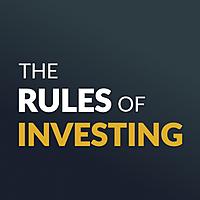Chris Joye's big contrarian call

Christopher Joye believes the United States is on the verge of a powerful economic boom. In his view, Trump’s mix of tariffs, tax cuts, and deregulation is reshaping global trade, fuelling a manufacturing revival, and attracting trillions of dollars in AI-driven investment. Add lower interest rates and large-scale fiscal spending, and Joye sees the conditions for a multi-year surge in growth.
It is not a view shared by most, but he is doubling down.
“My bigger contrarian idea is this proposition that Trump’s going to oversee exceptionally strong US growth," said Joye.
Beyond the US, Joye warns that the long end of the bond market is flashing amber as heavy government borrowing pushes yields higher, even as short-term cuts support housing. He also advises caution as $40 billion of hybrids roll off in the coming years, urging investors to stick with the major banks and avoid the liquidity traps of unlisted credit.
In this episode of The Rules of Investing, Joye unpacks his bullish call on the US, the signals coming from bond markets, and his advice for investors navigating a shifting landscape.
Click on the player to listen or read a summary below.
Summary prepared by a Livewire editor with the assistance of AI.
Super bullish on the US economy
Chris Joye is openly positive on the US economy and sees it as a contrarian opportunity. His optimism is built on Trump’s policy mix and a once-in-a-generation investment boom.
Back in April, Joye shifted from bearish to bullish, taking off hedges and buying billions of dollars in bonds as Trump moved to a more market-friendly stance. He believes Trump’s use of tariffs has been more successful than markets expected, generating revenue to offset fiscal stimulus.
“The tariffs are going to pay for 100% of his fiscal stimulus,” explained Joye.
Joye frames tariffs as a broad consumption tax, offset by cuts to income and corporate taxes. This combination encourages reshoring of manufacturing and reduces distortions in global trade. The result is a manufacturing revival at the same time as trillions of dollars are flowing into artificial intelligence.
“The US is going to be the central clearing house for all AI innovation and the central beneficiary,” he said.
He also highlights the foreign policy backdrop. Trump has pushed European allies to ramp up defence spending, triggering large infrastructure and military programs. At home, deregulation is clearing obstacles for investors across industries from crypto to manufacturing. In Joye’s eyes, these settings point to a prolonged period of strong growth.
There are risks. Restricting immigration could create labour shortages and wage pressures. That could see the Fed talking about rate hikes again in 2026 or 2027. But the net impact is positive.
Two key messages from the bond market
Joye sees two clear signals from the bond market. At the short end, rates are set to fall further. The Fed and RBA have already cut, and Joye expects another one or two moves lower.
“Bond markets are very clearly signalling that interest rates will fall a bit.”
That is constructive for borrowers and explains why Sydney property is moving higher. Prices there are rising at an 8.5% annual rate, and he is “very bullish on the Sydney housing market in particular.”
The long end of the curve tells a different story. Ten-year yields suggest rates will remain elevated. Governments are issuing huge amounts of debt and investors are demanding higher compensation to hold it.
Joye points to the UK, where 30-year bond yields are at levels not seen since the 1980s, and to Victoria, where debt has ballooned from $30–40 billion pre-COVID to nearly $300 billion today. “Bond markets are worried about debt issuance, they’re worried about inflation, they’re worried about politicians potentially interfering with central banks.”
His conclusion is simple. The short end is flashing green, but the long end is more amber. The one asset class that looks cheap on long-term metrics is government bonds, which Joye argues could be useful insurance in a diversified portfolio.
Where Joye is seeing value today
Markets are expensive almost everywhere. Equity valuations are stretched, credit spreads are tight, and even hybrids look rich. That leaves a few areas of interest.
First are senior bank bonds. Unlike hybrids and subordinated debt, senior spreads remain in line with long-term averages. Joye sees them as the safest, most liquid, and most fairly priced option in credit.
Second is duration. Ten-year government bond yields are much higher than their 25-year averages, offering value and portfolio protection if growth falters.
“It’s very hard to find an asset class that looks cheap compared to 25-year averages, but 100% government bond yields do,” argued Joye.
Third is the new issue market. Joye says new bond deals frequently come at attractive prices, creating short-term mispricings that active managers can exploit to boost returns.
He also flagged commercial property as cheap, alongside senior financial bonds, but has no interest in crypto despite Trump’s efforts to legitimise the sector.
What to do as hybrids disappear
The hybrid market is shrinking fast, with $40 billion of securities set to roll off from 2027. Replacement strategies are being marketed, but Joye is sceptical. He warns of illiquidity and default risks when moving into private credit or listed debt funds.
“You’ve got to be super careful… in shocks these things can trade at 40 to 60% discounts to their net asset values," he warned.
His advice is to stay with the same issuers you already know, the major banks, and move up the capital structure into subordinated or senior bonds. That way investors keep the same level of transparency and liquidity, without straying into unlisted assets that carry unfamiliar risks.
Going off-piste
Joye has recently taken to social media to share a few clips of his heli-skiing missions chasing storms in New Zealand. They've proven more popular than a bearish call on property prices!
When pressed to choose one place to ski for the rest of his life, Joye could not resist giving two answers.
“If it’s heli-skiing, it has to be New Zealand’s Harris Mountains and Mt Cook - the best terrain in the world. For resorts, I’d go Snowmass in Colorado, with Aspen’s four mountains right next door. Hard to beat.”
1 topic
1 contributor mentioned


